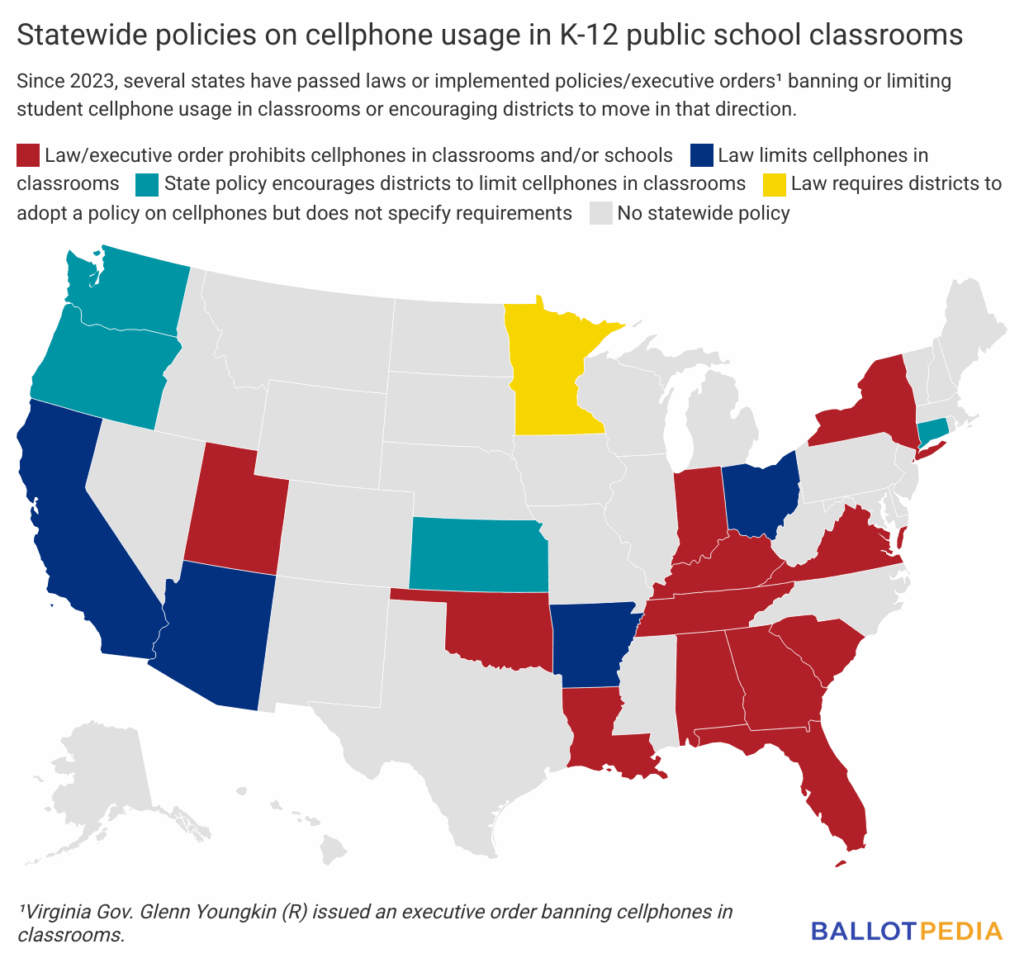Four (4) states enacted cellphone bans in May so far:
- Oklahoma Gov. Kevin Stitt (R) signed Senate Bill 139 on May 5 to institute a year-long ban on cellphone use in schools, requiring school districts to implement policies to enforce it.
- New York Gov. Kathy Hochul (D) announced a cellphone ban policy in schools on May 6, as part of the state budget for fiscal year 2026.
- Georgia Gov. Brian Kemp (R) signed House Bill 340 on May 9 to ban cell phone use in elementary and middle schools starting in Jan. 2026.
- Alabama Gov. Kay Ivey (R) signed House Bill 166 on May 14 to ban cellphone use in K-12 schools starting in the 2025-2026 school year.
All of the state policies prohibit unsanctioned cell phone usage from the beginning of the school day to the end of the days. Each policy does not apply to school-issued or school-used devices and have exemptions for use by students with medical or academic needs necessitating the use of a wireless device. The Oklahoma and New York policies require a means for emergency contact of students by parents.
Oklahoma's bill would apply for the 2025-2026 school year and would become optional for districts to enforce in the 2026-2027 school year and future school years. New York and Alabama's policies are effective for the 2025-2026 school year forward—Georgia's is effective Jan. 1 2026— and all three require local school districts to create policies implementing the prohibition.
The Missouri Legislature also passed a cellphone ban May 13 as part of Senate Bill 68, an elementary and secondary education bill covering multiple other topics. The cell phone provision requires districts to set their own cellphone use policy similar to the other bills, and would take effect in the 2026-2027 school year if signed. That bill was waiting for Gov. Mike Kehoe's signature as of May 14.
Support and opposition
Alabama Rep. Leigh Hulsey (R), who sponsored the Alabama legislation, said "[Teachers] needed that support, they needed that backup because they were having the same issues; the distractions, just problems. They shouldn’t have to be dealing with that everyday.”
In Oklahoma, Tulsa Public Schools Board Member John Croisant said, "We had already created a cell phone policy, which took cell phones out of the classroom, .... It made no sense but again, this is just another example of legislators trying to control everything and a little bit of government overreach."
Georgia Rep. Scott Hilton (R), who cosponsored the Georgia legislation, said he didn't push the cellphone prohibition for high schoolers because of concerns raised over students contacting family in the event of a school shooting.
New York parent Christine Crispino said, “I would want my child to have their phone to contact me in case of an emergency, such as a school shooting.”
What's the background?
Twenty (20) states, as of May 14, banned or limited cellphone use in K-12 classrooms. At least eleven states enacted cellphone bans or limits so far in 2025.

Legislation banning or limiting cellphone use differs in each state, though most require local school boards to adopt and enforce policies to implement the ban or limit. According to the National Center for Education Statistics (NCES), around 76% of schools said they banned the non-academic use of cell phones or smartphones during school hours during the 2021-22 school year, down from 91% in 2010. In many high schools, administrators allowed cell phone use at designated times during the school day, such as lunch.
Cellphone bans have occurred in five states with Democratic trifectas, three states with divided governments, and 10 states with Republican trifectas.
What are the arguments?
Supporters of cellphone bans in the K-12 classroom argue that they disrupt the learning environment. New York University Prof. Jonathan Haidt contended that cellphones distract students and inhibit them from engaging with their peers.
Opponents of cellphone bans argue that schools should teach students how to have a healthy relationship with technology rather than ban it. Writer and teacher Erica Barry argued that schools should teach students how to use their cellphones without becoming addicted to them.
Read more:



